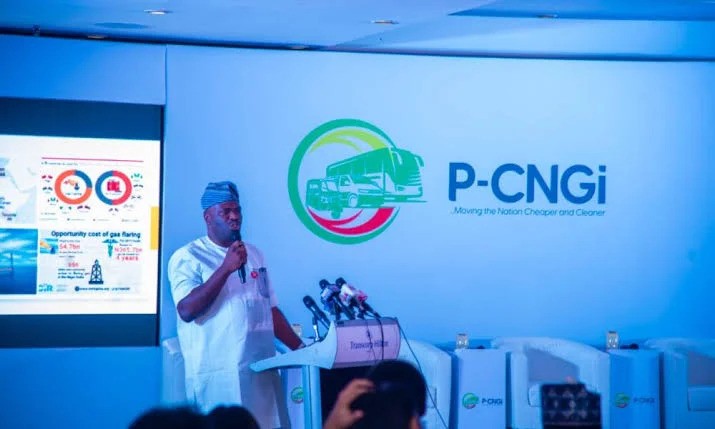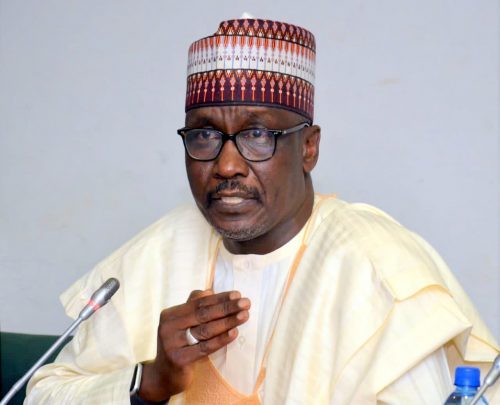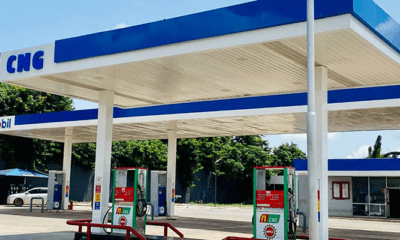Energy
FG attracts $50m investment for conversion of commercial buses to CNG

The Federal Government through the Presidential Compressed Natural Gas Initiative (P-CNGi) has attracted a 50 million dollar deal for the conversion of commercial vehicles to run on Compressed Natural Gas (CNG).
The P-CNGi Programme Director/Chief Executive, Mr Michael Oluwagbemi, said this on Saturday during a Live programme on television tagged ‘’Compressed Natural Gas Roll Out: Prospects for Economic Growth.”
Oluwagbemi said the deal, which was a private sector initiative, would enable the construction of CNG conversion workshop infrastructure across the country.
P-CNGi is a component of President Bola Tinubu administration’s palliative directed at providing succour to the masses, following the removal of fuel subsidy.
To alleviate the burden of rising fuel prices, the Federal Government allocated N100 billion from the N500 billion palliative budget to buy 5,500 CNG vehicles (buses and tricycles), 100 electric buses, and over 20,000 CNG conversion kits.
“We will be announcing on May 29, targeted conversion incentive programme for the mass transit sector.
“We are working with our partners in the mass transit sector, including the National Union of Road Transport Workers (NURTW) and the National Association of Road Transport Owners (NARTO), to determine modalities for providing the equipment and incentive,” he said.
He said the first phase of the initiative would roll out 100 conversion workshops and 60 refuelling sites across 18 states in Nigeria before the end of 2024.
“We are very well on track to meet all our objectives this year with respect to conversion centres, we are beginning to see the private sector jump in; as at Friday 85, conversion centre bidders were about to be completed.
“We expect 15 more to get started before the end of May; we will hit 100 targets before the end of 2024. The private sector leads and the government supports, it is definitely a good news for Nigeria.
“CNG is much safer in natural condition than PMS and Diesel, with bullet-proof container and high auto ignition temperature, almost one thousand degrees safer in natural condition than petrol,” he said.
In terms of reliability, he said it had regulations and standard developed by the Standards Organisation of Nigeria (SON).
He said a Nigerian gas vehicle monitoring system was also being established to ensure safety of operation from the point of conversion to the point of refuelling.
He said the National Automotive Design and Development Council (NADDC) and other agencies were also involved in promoting the initiative.
“Throughout the country we are rolling out conversion centres, we will be able to provide it at a subsidised cost and significant discount while allowing them to pay back slowly.
“For us as a government, it is not really subsidy, rather utilisation fund,” he said.
Also speaking, Dr Mohammed Bawa, Group Managing Director, ABG Group, said the Group had a partnership with banks to assist anyone willing to convert his or her vehicle.
He said since the initial investment was on the high side, the group could recommend for the bank to pay on behalf of anyone interested, while the person would repay over a period of time without interest.
“Nigerians are entrepreneurial by nature and always want an enabling environment and support by government.
“This government has taken the bull by the horn by putting in place the P-CNGi, which is doing a great job; automatically the private sector is already keying in.
“Not less than 20 private sector players have keyed into the CNG space and value chain, from conversion to refuelling. Now that the atmosphere is inviting, you will see many Nigerians investing in it,” he said.
He further said that before the end of May 2024, based on reliable information from the private sector, there would be at least six CNG refuelling centres in Abuja, as against only two stations currently.
Fuel subsidy removal caused an increase in transport fare, but the deployment of CNG vehicles is expected to reduce reliance on petrol and diesel thereby making transportation affordable and mitigate air pollution which aligns with the Paris Climate Accord.
Conversion of vehicles costs between N700,000 and N800,000, and vehicles can also operate on the energy mix of petrol and CNG after conversion safely.
Energy
Oil inches upward following report surrounding the death of Iran’s president


Oil prices saw a slight increase on Monday following report surrounding the death of Iran’s President Ebrahim Raisi, his foreign minister and others in a helicopter crash. The development is seen to have contributed to the overall market sentiment, which also included last week’s gains.
Brent oil futures for July saw a 0.3 percent rise, reaching $84.19 a barrel, while West Texas Intermediate (WTI) crude futures experienced a 0.2 percent increase, trading at $79.70 a barrel.
In a tragic turn of events, a helicopter carrying Iranian President Ebrahim Raisi and Foreign Minister Hossein Amirabdollahian crashed over the weekend in the mountainous terrain of northwestern Iran, with both leaders report dead. The loss of President Raisi comes at a time of heightened tensions between Iran and Israel, following a series of strikes exchanged earlier this year.
Prior to the report, crude oil prices had been experiencing an upward trend due to several key factors. Positive indicators such as the possibility of U.S. interest rate cuts and improving demand in China have contributed to this increase in appetite for crude.
Furthermore, the U.S. government’s announcement of its purchase of approximately 3.3 million barrels of oil to refill the strategic petroleum reserve has also bolstered market confidence. However, ongoing instability in the Middle East and its potential impact on oil supplies remains a significant concern, keeping Brent oil prices above the $80 mark for most of 2024.
As the week unfolds, oil markets are exercising caution in anticipation of crucial announcements regarding U.S. interest rates and the economy. The release of the Federal Reserve’s late-April minutes and speeches from several Fed officials would also be closely scrutinised for insights into potential policy shifts.
Additionally, the upcoming Organization of Petroleum Exporting Countries and allies (OPEC+) meeting on June 1st is expected to provide updates on the cartel’s plans to maintain ongoing production cuts, which could have a significant impact on global oil supplies.
Energy
NNPCL: 600 illegal refineries destroyed in two years – Kyari


The Group Chief Executive Officer of the Nigerian National Petroleum Company Limited, Mele Kyari, said the firm has destroyed over 600 illegal refineries in the last two years.
Kyari disclosed this during a stakeholder engagement between the Nigerian Association of Petroleum Explorationists and the NNPCL in Lagos, at the weekend.
He noted that the firm removed 5,800 illegal connections to Nigeria’s crude oil pipelines in the last two years.
According to him, the country is prospecting 1.7 million barrels per day in the coming months, up from April’s 1.28 mbpd.
The NNPCL boss also emphasised the need to fight insecurity in the oil and gas sector to increase production.
“How do you increase oil production? Remove the security challenges in our onshore assets. As we all know, the security challenge is real. It is not just about theft; it is about the availability of the infrastructure to deliver the volume to the market.
“No one will invest in oil production when he knows the production will not reach the market. Within the last two years, we have removed over 5,800 illegal connections from our pipelines and over 600 illegal refineries—cooking pots or whatever they were. You simply cannot get people to invest in it until you solve that problem,” he stated.
Energy
NDDC, Shell complete construction of Ogbia-Nembe road


The Niger Delta Development Commission (NDDC) and the Shell Petroleum Development Company (SPDC) have completed the construction of the 25.7-kilometre Ogbia-Nembe Road in Bayelsa State.
The road project is slated to be commissioned on Saturday, May 25, 2024.
Speaking during a joint inspection of the project by officials of the two organisations, the NDDC Managing Director, Dr Samuel Ogbuku, described the multi-billion-naira project as a legacy and flag-ship of intervention in the Niger Delta region.
Ogbuku said that the “star project,” with seven bridges, 53 culverts and 4 spurs, linking 14 communities, was a good example of what could be achieved through collaboration of development agencies.
He declared, “The Ogbia-Nembe road as a model in partnership, with emphasis on quality job delivery. We have redefined our standards to globally acceptable best practice and we will henceforth compel our contractors to abide by them.”
The NDDC boss said that the NDDC would be banking on multinational corporations such as Shell, Chevron, and others to collaborate with the Commission in executing legacy projects, noting, “The oil giants have what it takes to provide funding, technical assistance, and expertise in environmental management, community development and corporate social responsibility.”
“The SPDC has shown that in addition to its statutory obligation to contribute to the funding of the NDDC, it is also necessary to work with the Commission on specific impactful projects. I am sure that other International Oil Companies, IOCs, will feel challenged to toe the line of Shell to provide quality infrastructure for the people of the Niger Delta.”
Ogbuku said that NDDC was already in discussion with Chevron on forging a partnership for the construction of the Warri-Omadino-Escravos Road, in Warri North Local Government Area of Delta State.
He observed that the project, when completed, would link Warri to Escravos which is the hub of oil and gas activities in Warri, which was very important to the economy of Delta State and Nigeria at large.
The SPDC Corporate Relations Manager, West, Chief Ucheoma Amechi, said that as a company that attaches importance to quality job delivery in the execution of development projects, Shell was satisfied with what has been achieved at the Ogbia-Nembe Road. He gave kudos to the NDDC for doing a good job in the execution of the signature project.
The NDDC Director, Environmental Protection and Control, Engr Onuoha Obeka noted that the road, which cut through swampy terrain, encountered many challenges.
He observed, “We are happy that in spite of the challenges, the project connecting about 14 communities in the Ogbia-Nembe axis of Bayelsa State, has been completed. These communities were hitherto, not accessible by road. This is the first connection between them and the upland and it will boost the socio-economic fortunes of the people.”
Obeka said that the project was an opportunity for the NDDC engineering crew to improve their skills.
He noted, “The challenges we met here were unique, building a road in the mangrove swamp. You will notice that both sides of the road are filled with water. The road was actually built on a sand embankment of 2.5 million cubic metres of sand.”
He explained: “The road traverses the communities of Opume, Emekalakala, Akipelai, Sabatoru, Obiama, Etiama, Igbeta-Ewoama, Agbakabiriyai, Ekese, Iwokiri, Otatubo, Basambiri and Nembe, the project comprises seven bridges and 53 culverts. It also comprises a main alignment of 19.7 kilometres, Opume spur of 1.45 kilometres, Emakalakala spur of 2.685 kilometres, Akipelai spur of 850 metres and Ogbolomabiri spur of 1.05 kilometres.
The Area Manager for SETRACO, Engr. Joseph Cosme, assured the joint inspection team that the Commission had completed all the minor repairs on the road in preparation for the commissioning ceremony.
-
Finance4 months ago
Court orders Sen. Victor Umeh to repay N136m bank debt to AMCON
-



 Abuja Update3 months ago
Abuja Update3 months agoUNDP, FG partnership needed to achieve inclusion, equity- Minister
-
Abuja Update2 months ago
Banks drive stock market performance with N147bn gain
-
capital market2 years ago
Rt.briscoe, FBNH, Others halts negative performance of stock market
-
Submission Guidelines5 months ago
CALL FOR SUBMISSIONS: POETRY COLUMN-NND
-



 Health1 month ago
Health1 month agoCapacity training will reduce migration of health workers- NPHCDA
-



 Business4 weeks ago
Business4 weeks agoTingo Group unveils Tingo Electric, Tingo Cola drink at Lagos launch
-
News5 months ago
Oil thieves sponsoring malicious media campaign against Navy – Spokesman














